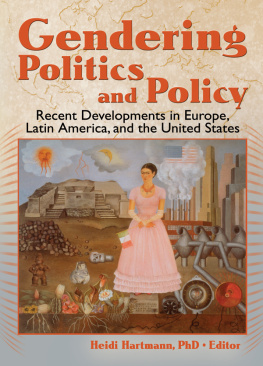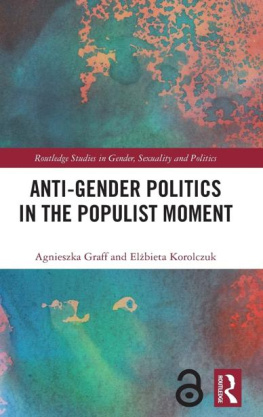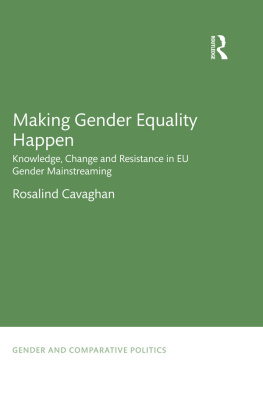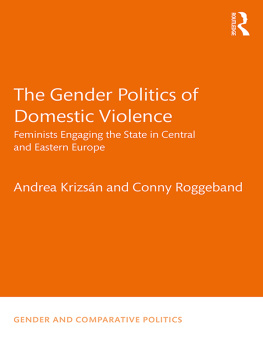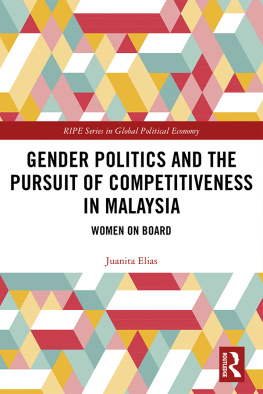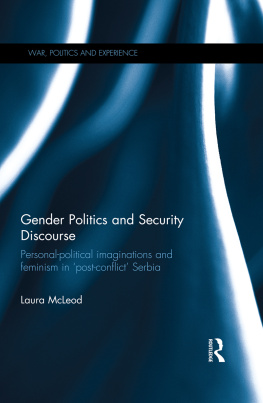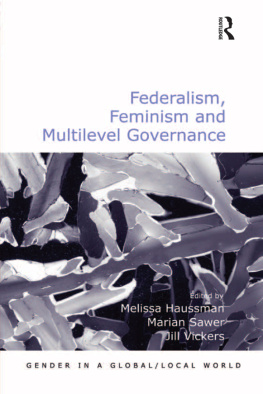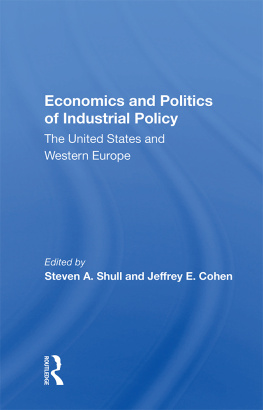First published by
The Haworth Press, Inc., 10 Alice Street, Binghamton, NY 13904-1580
This edition published 2012 by Routledge
Routledge
Taylor & Francis Group
711 Third Avenue
New York, NY 10017 | Routledge
Taylor & Francis Group
2 Park Square, Milton Park
Abingdon, Oxon OX14 4RN |
Gendering Politics and Policy: Recent Developments in Europe, Latin America, and the United States has been co-published simultaneously as Journal of Women, Politics & Policy, Volume 27, Numbers 1/2 2005.
2005 by The Haworth Press, Inc. All rights reserved. No part of this work may be reproduced or utilized in any form or by any means, electronic or mechanical, including photocopying, microfilm and recording, or by any information storage and retrieval system, without permission in writing from the publisher.
The development, preparation, and publication of this work has been undertaken with great care. However, the publisher, employees, editors, and agents of The Haworth Press and all imprints of The Haworth Press, Inc., including The Haworth Medical Press? and Pharmaceutical Products Press?, are not responsible for any errors contained herein or for consequences that may ensue from use of materials or information contained in this work. Opinions expressed by the author(s) are not necessarily those of The Haworth Press, Inc. With regard to case studies, identities and circumstances of individuals discussed herein have been changed to protect confidentiality. Any resemblance to actual persons, living or dead, is entirely coincidental.
Cover design by Kerry E. Mack
Library of Congress Cataloging-in-Publication Data
Womens Policy Research Conference (7th : 2003 : Washington, D.C.)
Gendering politics and policy : recent developments in Europe, Latin America, and the United States / Heidi Hartmann, editor.
p. cm.
Papers presented at the Seventh International Womens Policy Research Conference held in Washington, D.C. in 2003.
Co-published simultaneously as Journal of women, politics & policy, volume 27, numbers 1/2 2005.
Includes bibliographical references.
ISBN-13: 978-0-7890-3092-4 (hard cover : alk. paper)
ISBN-10: 0-7890-3092-6 (hard cover : alk. paper)
ISBN-13: 978-0-7890-3093-1 (soft cover : alk. paper)
ISBN-10: 0-7890-3093-4 (soft cover : alk. paper)
1. Women in politicsCongresses. 2. WomenGovernment policyCongresses. I. Hartmann, Heidi I. II. Journal of women, politics & policy. III. Title.
HQ1236.W65252 2005
320.082dc22
2005016406
ABOUT THE EDITOR
Heidi Hartmann, PhD, is the President of the Washington-based Institute for Womens Policy Research, a scientific research organization that she founded in 1987 to meet the need for women-centered, policy-oriented research. She holds a PhD degree from Yale University in economics. Dr. Hartmann is also Research Professor at The George Washington University.
Dr. Hartmann is a co-author of Unnecessary Losses: Costs to Americans of the Lack of Family and Medical Leave; Equal Pay for Working Families; and Survival at the Bottom: The Income Packages of Low-Income Families with Children. She has published numerous articles in journals and books and her work has been translated into more than a dozen languages. She lectures widely on women, economics, and public policy, frequently testifies before the U.S. Congress, and is often cited as an authority in various media outlets.
Prior to founding IWPR, Dr. Hartmann was on the faculties of Rutgers University and the New School for Social Research and worked at the National Research Council/National Academy of Sciences and the U.S. Commission on Civil Rights. In 1994, Dr. Hartmann was the recipient of a MacArthur Fellowship Award for her work in the field of women and economics, and, in 1995, she received an honorary Doctor of Law degree from Swarthmore College, her alma mater. She is Vice-Chair of the National Council of Womens Organizations.
Heidi Hartmann, Institute for Womens Policy Research and The George Washington University
The articles in this volume, entitled Gendering Politics and Policy: Recent Developments in Europe, Latin America, and the United States, reflect a broad range of concerns that political scientists, economists, other social scientists, legal scholars, and activists have about advancing womens rights and womens leadership at the dawn of the twenty-first century in a world that is increasingly global and in which countries increasingly act in a multinational context.
Nearly all the authors represented in this volume presented their work at the Seventh International Womens Policy Research Conference, Women Working to Make a Difference, held in Washington, DC, in 2003. The conference is convened every two years in June by the Institute for Womens Policy Research (IWPR) and co-sponsored by the Womens Studies and Public Policy programs at The George Washington University and the Friederich Ebert Stiftung. Ten of the twelve papers published here were selected from the more than 100 papers presented after an exhaustive review process. The authors revised their papers in response to reviewers comments and in many cases updated them to include analysis of events occurring in 2004 and 2005. Two additional papers were included in this volume based on the relevance of their content and following the usual review process for submitting manuscripts.
Mercedes Barquet and Sandra Osses, participants in a large cross-national research project in Latin America, open this volume with a feminist analysis of the important issue of governability in the fragile democracies of Latin America. In Governability and Womens Citizenship, they build upon the work of feminist political theorists and argue that if a new vision of womens citizenship could be developed, one that would fully engage women, these fragile democracies would improve their ability to govern and enhance their stability. Democratic governability is seen to require everyones participation on equal terms. Barquet and Osses, two social science scholars working in Mexico, use a Mexican government survey of mens and womens political attitudes, knowledge, and participation to explore womens citizenship deficit. While discussed in the context of developing countries, the issues Barquet and Osses raise speak to women in economically advanced countries as well, especially in the United States where our own machinery of democracy was found lacking in the 2000 and 2004 presidential elections and where women still hold only 15 percent of the seats in our national parliament, the U.S. Congress. This article, and the four others in the first section of this issue, Gendering Citizenship, Elections, and Social Capital, examine some of the most fundamental institutions and relationships in human society.

